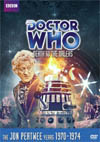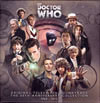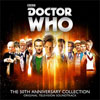Death to the Daleks
 |
 |
 |
DVD NTSC
Region 1




|
DVD PAL
Region 2


|
VHS Video
NTSC
 A A

NTSC
 B B

NTSC


PAL


|
|
(Doctor Who Story No. 72, starring Jon Pertwee)
- written by Terry Nation
- directed by Michael Briant
- produced by Barry Letts
- music by Carey Blyton, performed by the London Saxophone Quartet
- 4 episodes @ 25 minutes each
|
Story: The TARDIS suffers a mysterious power drain,
stranding the Doctor and Sarah on the planet Exxilon
and forcing them to search for the cause. A similar
fate has befallen a medical rescue expedition from Earth
whose members believe that a cure for a plague can be found here.
What secrets are waiting to be discovered in the unexplored
ancient alien city, which the locals protect as a holy shrine?
And why have the Daleks suddenly come to meddle in the affairs
here?
|
|
DVD Extras include:
- Audio commentary by director Michael Briant,
actors Julian Fox (Peter Hamilton) and
Cy Town (Dalek Operator),
sound designer Dick Mills,
costume designer L. Rowland Warne, and
assistant floor manager Richard Leyland.
Moderated by Toby Hadoke.
- "Beneath the City of the Exxilons" making-of featurette (27 min.) with
Briant, Fox, Warne, Leyland,
Arnold Yarrow (Bellal),
and Dalek voice expert Nick Briggs.
- 2003 interviews of Dalek Operators John Scott Martin
and Nick Evans. (13 min.)
- Raw studio footage (23 min.)
- Isolated Music by Carey Blyton
- Pop-up Production Note Subtitles
- Photo Gallery music and sound effects montage (6 min.)
- Easter Egg
- Behind the scenes footage & interviews (8 min.) from
"Dr. Who and the Daleks"
1965 Peter Cushing film
(theatrical remake of story no. 2).
Buyers' Guide Review
by Martin Izsak
|
|
(A more in-depth analysis, containing "SPOILERS" and intended
for those who have already seen the program, can be accessed
here.)
|
By now, it seems to have come to the attention of Doctor Who's
makers that simply going through all the old established formulas for
producing a Dalek story is not going to cut it anymore. Everyone
pulls together, and even if it isn't a great Pertwee era Doctor
Who story, it is a good improvement on the latest Dalek
stories for sure.
Writer Terry Nation exercises his imagination for one thing. Although
the script features a host of common elements from him, he treats
the Daleks in an interesting way,
forcing them to exercise their rusty social skills and
inventive technical genius. Their alliances
keep their portions of the script interesting, wrapping them into
plots and relationships worthy of any good Blake's 7
episode. For once, the magnificent alien city in this story is not
of Dalek or Skarosian design, allowing the Daleks to become explorers
of it and earn some points as good sci-fi protagonists as well. They
are also seen as effective problem solvers here.
Without going out of character, Daleks have become
interesting once again.
Onto the production side of things, the Daleks are largely done
better this time around. Even though Michael Wisher does all the
voices, he does a better job of differentiating each Dalek with a
different tone of voice by himself than he and Roy Skelton managed
when they worked together on
the previous Dalek story.
The Daleks also get a vast improvement in
weapons effects. Finally they can at least feature in as
exciting a shoot-out as one can find in most westerns or old war
films. Not very sci-fi, but on the money emotionally. Anything
was better than that stupid old full-screen negative image all by
itself, now thankfully retired. However, their weapons still
don't quite beat the exterminator's gas used in
the Peter Cushing films.
|
Dudley Simpson's only competition this season comes from
Carey Blyton, who manages to do the music for this story. Blyton
takes a far more thematic approach, which makes the story's music
far more memorable, and thus more to my liking, than most of Simpson's
recent contributions. Most of the music is wonderfully composed,
including the "Desolate Landscape" bits, and especially the
highly effective city theme with all its "Chants & Variants".
As for the "Dalek Retreat", I think this literally went in the wrong
direction. At its base emotional level, the music expresses a kind
of tiredness and a humorously doomed folly, and when applied to the
Daleks when they are meant to be at their most menacing, it labels
them as an old joke instead, and becomes the largest hindrance
in their otherwise successful attempts to make a good impression on
the audience during the story. There are very few places when the
retreat's natural emotional qualities can work here,
but these scenes really neither need nor have room for music either.
Blyton's theme for UNIT in
"The Silurians" (story no. 52)
hit a very similar emotional chord, but it worked in
that story in giving the sense that the soldiers were not all as
important as they believed themselves to be. Doing the same to the
Daleks in this story does not help matters at all.
It isn't ideal to limit a Doctor Who score to four saxophones
either. Thankfully the city theme is also chanted with vocals
and backed by a processed saxophone note or other suitable bass
sound, which is where the theme actually sounds its best. The
saxophones sound good in many places where the music simply needs
to build emotion: Sarah's first view of the city is suitably
ceremonious and awe-inspiring, the "desolate landscape" bits work
well, and one of the later build-up cues
is particularly well done. But again, saxophone sounds do not
a good Dalek theme make.
In the end, Blyton's score represents Doctor Who's willingness
to take an artistic risk, and even though not everything works, it
leaves behind some quality music far more memorable than
most of what Dudley Simpson has produced by clinging to safe old
methods. Blyton's score is my favourite of the season, with
only Simpson's "Florana" track managing to stand above it.
|
A suite of music from this story (3:50)
is available on:
|
Sound effects (2:54) and
music from this story (10:25) were released on:
 |
Audio CD -
Doctor Who:
The 50th Anniversary Collection
11-disc version (2014)
More info
|
|
Music by Carey Blyton
3 re-recorded tracks
"A Desolate Landscape" (1:41),
"Chants & Variants" (4:05, ending with an
improvement on the final cue), and
"Dalek March & Retreat" (1:31) feature on:
|
|
"Death to the Daleks" still has its problems. Although
John Abineri puts in a solid performance,
the other guest actors seem a little melodramatic in
their portrayals. Even Michael Wisher catches the bug for
a few of his scenes. The story
is also all action, without much in the way of thematic content.
At least the TARDIS is done properly in this story. Enjoy
the interior scenes while you can; this is the only story to feature
the insides in the 2.5 season period between
"Planet of the Daleks" (story no. 68) and
"Planet of Evil" (story no. 81).
We get a dark but decent visual materialization,
with the sound going a bit warbly from an energy drain, which works.
There is plenty of juxtaposition of interior and exterior scenes,
demonstrating the essentials of the TARDIS to those who may not
be familiar with it. Good stuff.
Strictly speaking, if I am going to object to the titles of a
number of episodes from Season 32
and beyond - in the eras of Matt Smith and Peter Capaldi -
I really ought to do the same for this one particular classic era story.
Although it can perhaps get away with it somewhat easier since Daleks
clearly are fictional creations, we must also note that this story's
title really has nothing much to do with the content of the adventure.
I think I would have preferred if it was called "Planet of the Exxilons",
or something of that nature.
In the end, the story may sit at the bottom of the season's
rankings, simply for being outshone by the other stories. One does
take heart though, that Dalek stories are getting better. While
"Day of the Daleks" (story no. 60)
had much more interesting content and better
writing, this story has provided the Daleks with their best
technical production of the Pertwee era.
This story is available on DVD and VHS video.
Click on the Amazon symbol for the location nearest you
for pricing and availability:
 |
 |
 |
DVD NTSC Region 1
for the North American market:

 in the U.S.
in the U.S.

 in Canada
in Canada
|
DVD PAL Region 2

 for the U.K.
for the U.K.
|
VHS Video
NTSC
 A A
 in the U.S.
in the U.S.
NTSC
 B B
 in the U.S.
in the U.S.
NTSC

 in Canada
in Canada
PAL

 for the U.K.
for the U.K.
|
Comments on this article are welcome. You may contact
the author from this page:
Contact page
|











